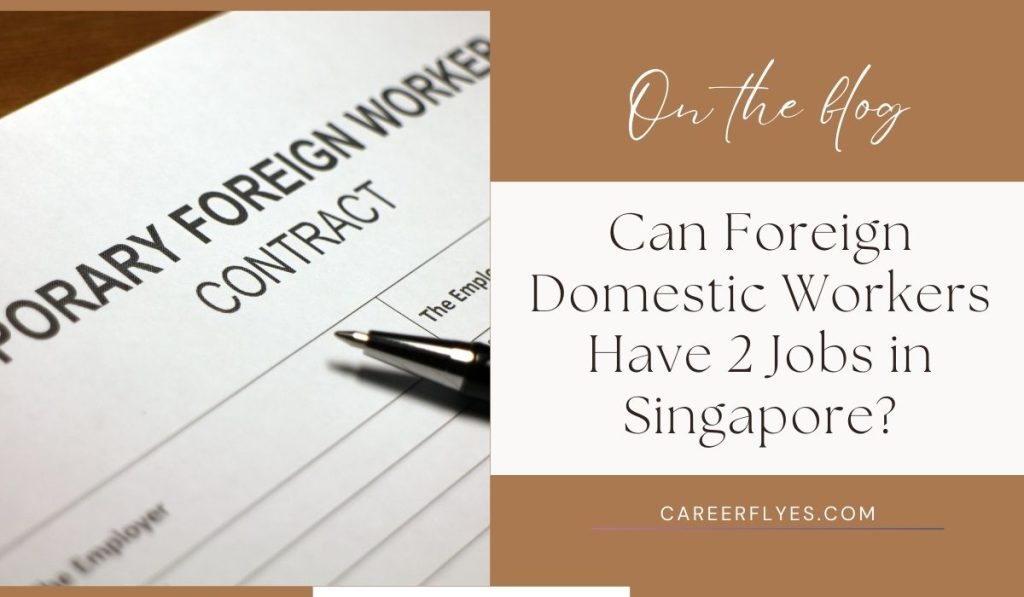Can Foreign Domestic Workers Have 2 Jobs in Singapore?
3 min read
Foreign domestic workers, or FDWs, play a vital role in supporting families in Singapore, assisting with household tasks and caregiving. However, Singapore has strict regulations about their employment. One common question is whether foreign domestic workers are allowed to hold more than one job. Here’s what you need to know about the rules and why they matter.
Legal Restrictions on Multiple Jobs for Foreign Domestic Workers
In Singapore, foreign domestic workers are granted a specific type of work permit. This work permit clearly states that they are only allowed to work for one employer, who is responsible for them. Singapore’s Ministry of Manpower (MOM) strictly prohibits foreign domestic workers from holding more than one job, even if it’s part-time or temporary. This regulation ensures that FDWs focus fully on the responsibilities assigned by their single employer, helping to maintain the quality and safety of their work environment.
The restriction on multiple jobs applies to all types of work, whether within a household or outside. If a foreign domestic worker or their employer violates this rule, both can face serious penalties. These penalties may include fines or even revocation of the worker’s permit, which can lead to deportation.
Can Employers Allow Their Domestic Workers to Take on Side Jobs?
No, employers cannot legally allow their foreign domestic workers to take on any side jobs, either within another household or in a different setting. Employers who knowingly permit this are violating Singapore’s employment laws and can face fines or other legal consequences. It is crucial for both employers and FDWs to respect these laws to avoid these risks.
What Types of Work Are Foreign Domestic Workers Allowed to Do?
The Ministry of Manpower (MOM) clearly outlines the responsibilities and duties allowed for foreign domestic workers in Singapore. These tasks typically include household chores, childcare, and caregiving for elderly family members. The work permit does not extend to any employment outside these household duties, ensuring that FDWs focus entirely on their assigned household responsibilities.
Alternatives to Secondary Jobs for Foreign Domestic Workers
While secondary jobs are not allowed, there are alternatives that can help FDWs earn benefits within legal boundaries. Employers can choose to offer additional benefits or allowances, as long as these are within the guidelines. For example, employers might give extra compensation for duties outside the standard scope of household tasks, such as providing additional assistance for family events. These benefits can help FDWs feel appreciated and supported while staying within the legal framework.
FDWs can also explore other activities for personal growth, such as volunteering or joining skill development programs. These activities can offer learning opportunities without breaching employment laws. Personal growth activities, like skill-building classes, can enhance their experience in Singapore and offer new perspectives while respecting legal boundaries.
Potential Risks of Working Multiple Jobs as a Foreign Domestic Worker
If an FDW takes on an additional job outside their permitted scope, this can lead to significant legal trouble. Such actions are classified as immigration offenses under Singapore’s employment laws. Consequences can include fines, cancellation of the work permit, and deportation. Moreover, violating these rules may affect their future chances of working in Singapore, as records of violations remain on file.
Apart from legal risks, taking on multiple jobs could lead to burnout. The demands of an additional job, even part-time, may create physical and mental strain, impacting the FDW’s well-being. Maintaining one job allows FDWs to manage their workload responsibly, which is essential for their health and job satisfaction.
Conclusion
In Singapore, foreign domestic workers are restricted to working with only one employer to ensure their responsibilities are well-managed and to protect both the worker and employer. This regulation not only ensures that FDWs focus fully on their assigned duties but also maintains their well-being and legal standing. By understanding and respecting these rules, employers and FDWs can avoid penalties and create a healthy, supportive work environment.
If you have any questions or need clarification, it’s recommended to check with Singapore’s Ministry of Manpower or speak with a legal expert. Complying with these rules helps ensure a positive, secure experience for all inv





